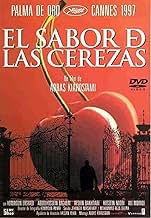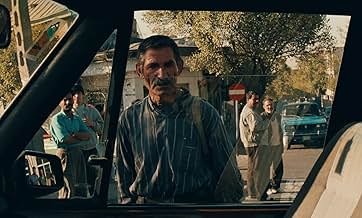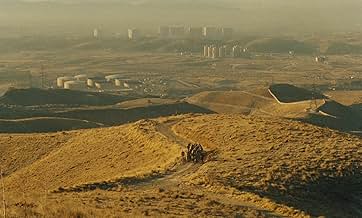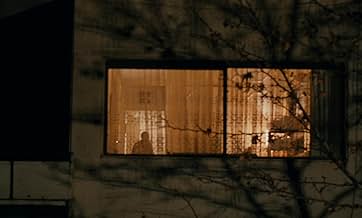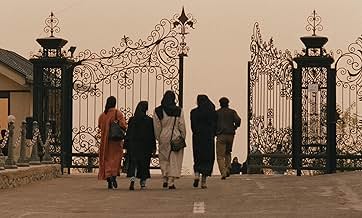- Premios
- 3 premios ganados y 5 nominaciones en total
- Dirección
- Guionista
- Todo el elenco y el equipo
- Producción, taquilla y más en IMDbPro
Opiniones destacadas
I have watched many films dealing with the theme "life & death". But this is the greatest one. The story is simple (even incomplete) but I think Abbas tells us too much.
Through the dialogue between different people from different classes, everyone has his own attitude about "life & death". I think we can't say which is right & which is wrong. Abbas only gives it to us & let us think for ourselves.
Every scene is simple & ordinary, but has a certain strange fascination. I have seen "Through The Olive Trees" before (also directed by Abbas). To be honest, I don't like it, although it's said to be a good film. But this one is different. "Go see it" is what I want to say.
Through the dialogue between different people from different classes, everyone has his own attitude about "life & death". I think we can't say which is right & which is wrong. Abbas only gives it to us & let us think for ourselves.
Every scene is simple & ordinary, but has a certain strange fascination. I have seen "Through The Olive Trees" before (also directed by Abbas). To be honest, I don't like it, although it's said to be a good film. But this one is different. "Go see it" is what I want to say.
Although I've seen many movies from other Iranian and Middle Eastern directors, this is the first I've watched from the late director, Abbas Kiarostami. And like some of those others - Nuri Ceylan from Turkey comes to mind - Kiarostami, in this story, exclusively concentrates on questions about the human condition. Specifically, it's about the self-destructive urge by one man. And it is here that Kiarostami inverts the whole idea of helping those who contemplate suicide.
Suicide, in itself, is a ready and obvious turn-off for many viewers, probably. And coupled with the apparent treacle-like pace of the narrative and the repetitive scenes of a lone man, Badii (Homayoun Ershadi), driving in and around hills outside Tehran, this story gives a whole new dimension to the idea of going over the same ground, again and again, to prove a point. And all the while we, as viewer, are inside the auto for most of this movie, up close and very personal....
But to avoid seeing this movie would be a big mistake, in my opinion.
I say that simply because the idea of suicide has probably occurred to most people, including myself, at some time in their lives. Whether that idea was part of Kiarostami's motivation for making this movie, we will never know, of course. I dare say it occurred to him, though.
At the first frame, we're in Baddii's well-worn Range Rover as he drives, his face set, his gaze wandering here and there, searching for a likely assistant for his plan to kill himself. In sequence, he stops a variety of men - a seminarian, a young soldier, a security guard; each man and Badii converse about his need to have somebody help him to suicide, Badii describing what a helper must do. Each time, Baddi has no success until, with a blindingly quick jump-cut, an old man, Bagheri (Abdolrahman Bagheri) is in the car, a helper who finally agrees to abide by Badii's wishes.
So, after taking Bagheri to close where he lives, Badii drives off, content that he has secured a deal; rapidly, however, he drives back in a fluster, as doubts creep into his mind. Frantically, he walks around the area until he finds the old man Bagheri to seek further assurance he will indeed help Badii next morning. Somewhat annoyed, the old man again gives his solemn promise. And stalks off.
Slowly then, Badii returns to his home/apartment, makes his final preparations, makes a point of turning off all the lights as he leaves, locks the door, leaves his car, and then takes a taxi back to the cherry tree, he had previously selected, at which he will terminate his life during the night, and as thunderstorms - a much-overused trope perhaps - begin.
It is there, then, that I will leave you to find out why Bagheri decided to help, and about Badii's fate that night. And about an absolutely unexpected ending.
It's a bleak story, but one that is played out in too many ways by thousands every day, more or less in every country on the planet, probably. Perhaps then, Kiarostami is urging us to think upon that more often as we all traverse our own daily ups and downs - and especially in relation to those who are nearest. Once seen, this is not a movie to forget.
Recommended for all, except toddlers obviously. Give it eight out of ten.
Suicide, in itself, is a ready and obvious turn-off for many viewers, probably. And coupled with the apparent treacle-like pace of the narrative and the repetitive scenes of a lone man, Badii (Homayoun Ershadi), driving in and around hills outside Tehran, this story gives a whole new dimension to the idea of going over the same ground, again and again, to prove a point. And all the while we, as viewer, are inside the auto for most of this movie, up close and very personal....
But to avoid seeing this movie would be a big mistake, in my opinion.
I say that simply because the idea of suicide has probably occurred to most people, including myself, at some time in their lives. Whether that idea was part of Kiarostami's motivation for making this movie, we will never know, of course. I dare say it occurred to him, though.
At the first frame, we're in Baddii's well-worn Range Rover as he drives, his face set, his gaze wandering here and there, searching for a likely assistant for his plan to kill himself. In sequence, he stops a variety of men - a seminarian, a young soldier, a security guard; each man and Badii converse about his need to have somebody help him to suicide, Badii describing what a helper must do. Each time, Baddi has no success until, with a blindingly quick jump-cut, an old man, Bagheri (Abdolrahman Bagheri) is in the car, a helper who finally agrees to abide by Badii's wishes.
So, after taking Bagheri to close where he lives, Badii drives off, content that he has secured a deal; rapidly, however, he drives back in a fluster, as doubts creep into his mind. Frantically, he walks around the area until he finds the old man Bagheri to seek further assurance he will indeed help Badii next morning. Somewhat annoyed, the old man again gives his solemn promise. And stalks off.
Slowly then, Badii returns to his home/apartment, makes his final preparations, makes a point of turning off all the lights as he leaves, locks the door, leaves his car, and then takes a taxi back to the cherry tree, he had previously selected, at which he will terminate his life during the night, and as thunderstorms - a much-overused trope perhaps - begin.
It is there, then, that I will leave you to find out why Bagheri decided to help, and about Badii's fate that night. And about an absolutely unexpected ending.
It's a bleak story, but one that is played out in too many ways by thousands every day, more or less in every country on the planet, probably. Perhaps then, Kiarostami is urging us to think upon that more often as we all traverse our own daily ups and downs - and especially in relation to those who are nearest. Once seen, this is not a movie to forget.
Recommended for all, except toddlers obviously. Give it eight out of ten.
I watched the Criterion DVD a few days ago and I thought this film was incredible. It's amazing to me that such an incredible film could be made without the use of tracking shots, multiple camera angles, tilts, pans, and all the other camera techniques that most countries use in their films.
Iran has a very young film industry that doesn't have the money or resources that many other film industries have. For what the Iranian film industry has at its disposal, this film is an exceptional achievement!
This film is a great example of how the expression of human beings' feelings and ideas cannot be held back by censorship. Kudos to Kiarostami for creating a very heartfelt commentary on the effects of oppression on the human soul.
Iran has a very young film industry that doesn't have the money or resources that many other film industries have. For what the Iranian film industry has at its disposal, this film is an exceptional achievement!
This film is a great example of how the expression of human beings' feelings and ideas cannot be held back by censorship. Kudos to Kiarostami for creating a very heartfelt commentary on the effects of oppression on the human soul.
"I understand how difficulty you have comprehending the last scene of this movie. I sympathize with you. But this has been deliberate on my part. In "Taste of Cherry" I have tried to keep a distance between my spectator and the protagonist. I didn't want spectators emotionally involved in this film. In this film, I tell you very little about Mr. Badie, I tell you very little about what his life is about, why he wanted to commit suicide, what his story is I didn't want the spectators get engaged in those aspects of his life. For that purpose I had to keep Mr. Badie away from the audience. So he is a distant actor in a way. First I thought to end the movie at the point when he laid down on his grave but later I changed my mind. I was uncomfortable to end it at that point because I was very concerned, and am always concerned, about my spectators. I do not want to take them hostage. I do not want to take their emotions hostage. It is very easy for a film-maker to control the emotions of spectators but I do not like that. I do not want to see my audience as innocent children whose emotions are easily manipulable.
I was afraid that if I ended the movie where Mr. Badie laid down on his grave the spectator would be left with a great deal of sadness. Even though I didn't think the scene was really that sad, I was afraid that it would come out as such. For that reason I decided to have the next episode where we have the camera running as Mr. Badie was walking around. I wanted to remind spectators that this was really a film and that they shouldn't think about this as a reality. They should not become involved emotionally. This is much like some of our grandmothers who told us stories, some with happy and some with sad endings. But they always at the end would have a Persian saying which went like this "but after all it is just a story! . . . The very last episode reminds me of the continuation of life, that life goes on, and here the audience is confronted with the reality they had hoped that Mr. Badie would be alive and there he is a part of nature and nature still continues and life goes on even without Mr. Badie. And if one could really think about being or not being present in life, or if one thinks about it in terms of the real implication of such presence, one might not in fact engage in committing suicide at all. The person committing suicide might think that s/he is taking revenge from the society, nature, life, powers to be, and so on. But s/he don't realize that after a suicide life still goes on and things stay the way they are. I could interpret this in a different way. If my audience is as creative as I imagine them to be, they can take this in a variety of interpretations and I can sit here and every time make a different interpretation of it, as every time one can creatively reinterpret the reality. "
I was afraid that if I ended the movie where Mr. Badie laid down on his grave the spectator would be left with a great deal of sadness. Even though I didn't think the scene was really that sad, I was afraid that it would come out as such. For that reason I decided to have the next episode where we have the camera running as Mr. Badie was walking around. I wanted to remind spectators that this was really a film and that they shouldn't think about this as a reality. They should not become involved emotionally. This is much like some of our grandmothers who told us stories, some with happy and some with sad endings. But they always at the end would have a Persian saying which went like this "but after all it is just a story! . . . The very last episode reminds me of the continuation of life, that life goes on, and here the audience is confronted with the reality they had hoped that Mr. Badie would be alive and there he is a part of nature and nature still continues and life goes on even without Mr. Badie. And if one could really think about being or not being present in life, or if one thinks about it in terms of the real implication of such presence, one might not in fact engage in committing suicide at all. The person committing suicide might think that s/he is taking revenge from the society, nature, life, powers to be, and so on. But s/he don't realize that after a suicide life still goes on and things stay the way they are. I could interpret this in a different way. If my audience is as creative as I imagine them to be, they can take this in a variety of interpretations and I can sit here and every time make a different interpretation of it, as every time one can creatively reinterpret the reality. "
This is film at its simplest: pure cinema. And then he pulls out the rug from underneath you. The director removes the event from the film, in doing so calls attention not to what the protagonist's action will be, but rather the reason for the action. Nor does he make the reason specific, though the concerns are human, universal, which transcends the specific. Foremost this film is about cinema, cinema and the what it means to be, to exist.
¿Sabías que…?
- TriviaThe film was shot without a proper script, relying on improvisations.
- ErroresIn the opening scene, as Mr. Badhi is driving past laborers looking for work, the same middle-aged white haired man, wearing a checkered sweater vest, is seen twice.
- Citas
Mr. Bagheri: If you look at the four seasons, each season brings fruit. In summer, there's fruit, in autumn, too. Winter brings different fruit and spring, too. No mother can fill her fridge with such a variety of fruit for her children. No mother can do as much for her children as God does for His creatures. You want to refuse all that? You want to give it all up? You want to give up the taste of cherries?
- ConexionesFeatured in Especial Cannes: 50 Anos de Festival (1997)
Selecciones populares
Inicia sesión para calificar y agrega a la lista de videos para obtener recomendaciones personalizadas
- How long is Taste of Cherry?Con tecnología de Alexa
Detalles
- Fecha de lanzamiento
- Países de origen
- Sitios oficiales
- Idioma
- También se conoce como
- Taste of Cherry
- Locaciones de filmación
- Productoras
- Ver más créditos de la compañía en IMDbPro
Taquilla
- Total a nivel mundial
- USD 11,207
Contribuir a esta página
Sugiere una edición o agrega el contenido que falta

Principales brechas de datos
By what name was El sabor de las cerezas (1997) officially released in India in Hindi?
Responda


